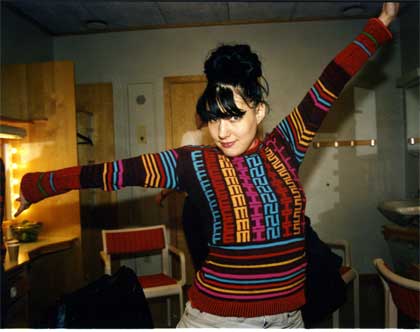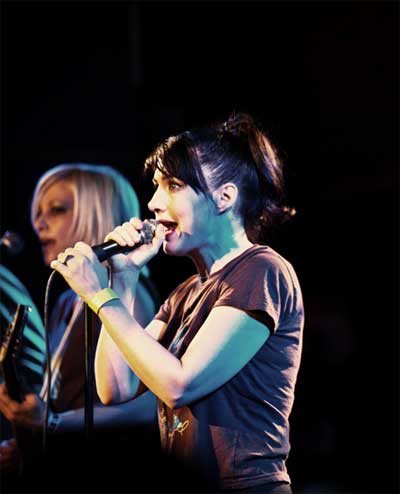Film (2013)
Directed by Sini Anderson
Brattle Theater
Cambridge, MA
December 6-12, 2013
Produced by Sini Anderson, Gwen Bialic, Tamra Davis, Rachel Dengiz, Erin Owens, Alan Oxman
Cinematography by Jennie Jeddry, Moira Morel
Film Editing by Jessica Hernández, Bo Mehrad
With Kathleen Hanna, Adam Horovitz, Joan Jett, Carrie Brownstein, Tavi Gevinson, Kim Gordon, Corin Tucker, Jennifer Baumgardner, Lynn Breedlove, Johanna Fateman, Jocelyn Samson, Kathryn Wilcox

in “The Punk Singer”
Photo: IFC Films
Inspired by feminist writer Kathy Acker, Hanna originally wanted to be an author. Advised that the sung word traveled further than the printed one, she started a band, despite not knowing much about music. Neither, apparently, did her bandmates, but somehow they prevailed and began to make a considerable name for themselves as Bikini Kill.
According to the numerous accounts of friends and observers, Hanna had an unrivaled power to seduce audiences, conveying the force of her personality through her intensely passionate vocalizations.
Many of them are, true to punk, raucous and rant-like, but genuine. The edges are coarse and the harmonics of the music are secondary to the urge and declamation of the message; in this case, it is a continuously unfolding articulation by an artist dedicated to a feminist mission.
Rough hewn rather than finely attuned, this sort of noble musical primitivism becomes primordially accessible to those for whom it speaks, its urges direct and its messages clear.
Despite her intensity and anger in performance, Hanna, in personal interview, is charmingly straightforward, and full of not-put-on self-effacement. She seems genuinely humble and decent about the intent of her work and of her own artistic boundaries and limitations.

in “The Punk Singer”
Photo: IFC Films
The film creates its own internal drama by initially asking why Hanna quits singing in the late 1990s, despite her apparent continuing artistic and political passions. More or less structuring itself around this focus, the story eventually gets fleshed out, and the question is answered.
In the end, however, the posing of the question early on in this way seems a bit of a ruse. There are other, more subtle, dramas that play into Hanna’s life and career, and the film might as easily have been straightforward about its big secret from the beginning without losing a beat. As well, it holds her romantic life in some suspense, which, in this case is oddly interesting because of its unexpectedness, but would have been just as interesting without the added suspense.
Contextualizing Hanna’s work, telling a bit more about the punk rock movement and how Hanna fit in with other feminist elements, would have provided supplemental weight that could have made these dramas important, though not such focal, features. Told more as an element of cultural history in more explicit context, this interesting portrait of an individual punk rocker could have borne a more emblematic role for the movement as a whole.
– BADMan
Leave a Reply